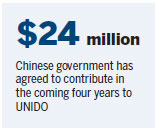UN body vows synergy with China's plan
The newly re-elected chief of the United Nations Industrial Development Organization believes the synergy of UNIDO with China's Belt and Road Initiative could result in sustainable growth in the world.
Li Yong, who received his second term as director general of the Vienna-based UNIDO on Monday, said industrialization is the driver for development and will be continuously promoted during his new mandate till 2021.
Li undertook agenda reform after taking over UNIDO in 2013 to look for inclusive and sustainable industrial development in member states. That year, China proposed its Belt and Road Initiative.
"We will continue to seek synergies between our agenda and China's Belt and Road Initiative, which is also inclusive and aims to realize common prosperity and development," Li said.
Li said his organization has already signed an agreement with Chinese government regarding to the initiative and the cooperation will be deepened during his upcoming mandate.
He appreciated that the Chinese government has agreed to contribute $24 million in the coming four years and he also said more partners from China will get involved in UNIDO programs.

Li said UNIDO will be deeply implementing the 2030 agenda of UN's Sustainable Development Goals and specifically, it will be building "resilient infrastructure, promote inclusive and sustainable industrialization and foster innovation".
"Nearly all our agenda is relevant to the Belt and Road Initiative and we are ready to deepen cooperation," Li said.
To realize its agenda, UNIDO has involved some pilot countries to help form their industrial development policy. Ethiopia, Senegal and Peru are among the first group of nations and on Monday, Cambodia and Kyrgyzstan were added to the list.
By expanding the model to additional countries, UNIDO will cover each geographical region of the world and thus complete the piloting phase, which will be introduced in the Arab region in 2018.
Sound, stable policy
Zhang Huarong, chief-executive of Huajian Shoe Co in Ethiopia, said the UNIDO should continue to work with pilot countries to shape sound and stable industrial policy and legal framework for some poor and developing countries.
Zhang said his company's export has reaped $30 million of foreign reserve for Ethiopia every year, accounting for the country's 60 percent of the total annually. "We aim to expand and increase size of local employment; we expect a stable and prospective policy and legal framework for future development," Zhang said in Vienna.
"I think the UNIDO can play a role."
Li said the pilot project has brought together different national ministries - from industry to finance, to agriculture and environment - with development partners around the same table, to create more synergy between the different interventions that support inclusive and sustainable industrial development.
"This cooperation platform is essential for ensuring the effective coordination of resources - be it finance, technology or expertise - the key elements needed for the realization of large-scale industrial development projects," said Li.
Cham Prasidh, senior minister of industry and handicraft of Cambodia, said the initiative is particularly timely as his country has recently graduated from low-income to lower middle-income.
"Thus this shifting from grant-funded to loan-funded development support and therefore seeking stronger partnership with financial institutions, which is a key component of the PCP approach," said Prasidh.
fujing@chinadaily.com.cn
(China Daily 11/29/2017 page12)














